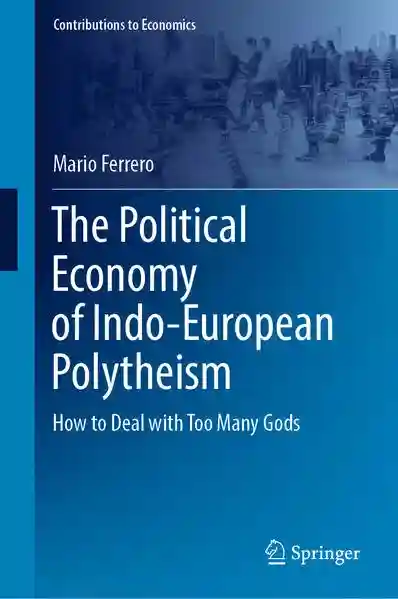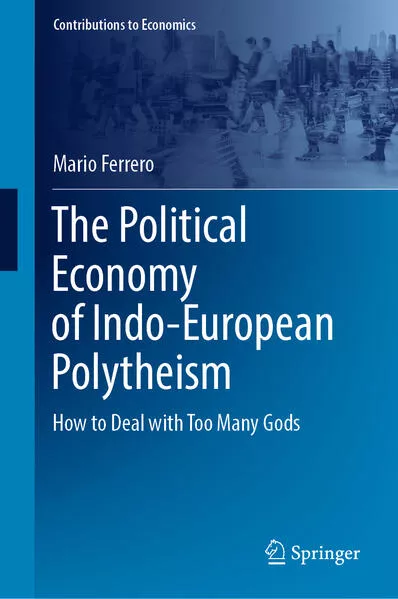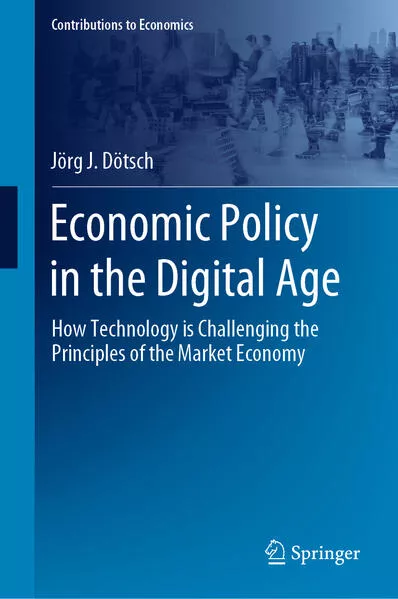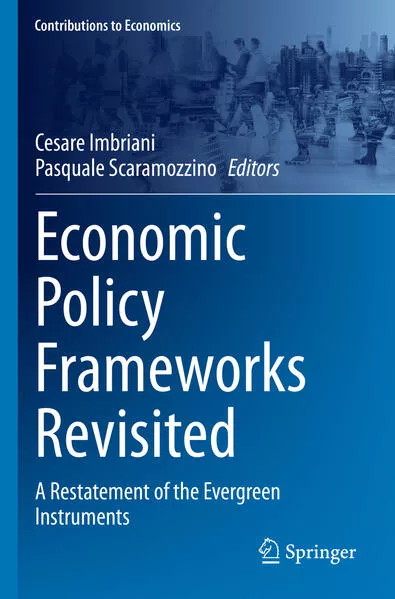Chronologie aller Bände (1 - 8)

Die Reihenfolge beginnt mit dem Buch "The First Decade of Living with the Global Crisis". Wer alle Bücher der Reihe nach lesen möchte, sollte mit diesem Band von Anastasios Karasavvoglou beginnen. Der zweite Teil der Reihe "The Political Economy of Indo-European Polytheism" ist am 23.04.2022 erschienen. Mit insgesamt 8 Bänden wurde die Reihe über einen Zeitraum von ungefähr 9 Jahren fortgesetzt. Der neueste Band trägt den Titel "Economic Policy in the Digital Age".
- Anzahl der Bewertungen für die gesamte Reihe: 1
- Ø Bewertung der Reihe: 5
- Start der Reihe: 28.01.2016
- Neueste Folge: 15.05.2025
Diese Reihenfolge enthält 8 unterschiedliche Autoren.
- Autor: Karasavvoglou, Anastasios
- Anzahl Bewertungen: 0
- Ø Bewertung:
- Medium: Buch
- Veröffentlicht: 04.02.2016
- Genre: Sonstiges
The First Decade of Living with the Global Crisis
This volume sheds new light on economic developments in several countries of Southeast Europe. The European Union and especially the eurozone continue to experience rhythms of fiscal crisis, as can most clearly be seen in the debt crisis in the South Periphery. Despite the fact that several measures and decisions have been taken to deal with the crisis (banking union, liquidity support from the European Central Bank), proposals to reform Europe’s strategic policy in order to find a way out of the crisis have been put forward.
This book explores the respective roles that specific sectors, e.g. the agricultural sector, social capital, tax policies and labour immigration, can play in this regard. The importance of international economic relations (exports, imports, FDI, exchange rates) is analysed, in order to illustrate the nature of the economic developments and the major economic difficulties these countries face.
- Autor: Ferrero, Mario
- Anzahl Bewertungen: 0
- Ø Bewertung:
- Medium: Buch
- Veröffentlicht: 24.04.2022
- Genre: Roman
The Political Economy of Indo-European Polytheism
- Autor: Dötsch, Jörg J.
- Anzahl Bewertungen: 1
- Ø Bewertung: 5.0
- Medium: Buch
- Veröffentlicht: 18.06.2024
- Genre: Politik
Economic Policy in the Digital Age
This book addresses how digital technology is challenging the principles of the market economy and the consequences for economic policy.
Applying the approach of the Freiburg School as a heuristic perspective, the study examines the concrete effects of digital technology on the price system and monetary policy, the openness of markets, the role of private property, and labour markets.
It highlights the emergence of digital innovations such as digital currencies, digital goods, artificial intelligence, digital platforms and the sharing economy and discusses the challenges these innovations pose for economic governance and the development of adequate economic policy instruments.
This comprehensive overview provides a basic understanding of the scope of the digital transformation and addresses a wide scale of important aspects of e.g. competition and trade policy, the impact of robotisation on labour market policy, and how economic policy must incorporate social aspects.
The book appeals to scholars and students of economics, public management professionals, and anyone interested in the challenges of digitalisation in the context of economic policy.
- Autor: Kitsikopoulos, Haris
- Anzahl Bewertungen: 0
- Ø Bewertung:
- Medium: Buch
- Veröffentlicht: 30.08.2024
- Genre: Sonstiges
An Economic History of British Steam Engines, 1774-1870
This book traces the diffusion trajectory of the second and third generation of British steam engines, the Watt and high-pressure models, covering the period 1774 to 1870. It begins by subjecting to econometric analysis the latest version of Dr. Kanefsky's database on 18th century steam engines coming up with an upward revision of the total amount of horsepower installed by 1800. Subsequent chapters delve into the determinants of the diffusion process through the third quarter of the 19th century relating to engines used both in mining and industry as well as transportation (railways, steam cars).
The book's main contribution to the literature lies in drawing material from a very large volume of 18th- and 19th-century sources found in the Dibner Library of Rare Books, Smithsonian, and by utilizing a fair amount of technical literature pertaining to the economic factors driving the diffusion process. This great expansion of the empirical material has led to bringing multiple revisions to the work of other authors on the key aspects and determinants of the diffusion process. In conjunction with the publication by the author of an earlier monograph on the first generation of steam engines, the Newcomen model, the present study completes the task of offering the most comprehensive account of the preeminent and most strategic technology of the British Industrial Revolution.
This book will appeal to students, scholars, and researchers of economic history and history of technology, interested in a better understanding of the industrial revolution in general and the role of British steam engines in particular.- Autor: Imbriani, Cesare
- Anzahl Bewertungen: 0
- Ø Bewertung:
- Medium: Buch
- Veröffentlicht: 21.09.2024
- Genre: Politik
Economic Policy Frameworks Revisited
This volume presents state-of-the-art contributions to the theory and practice of economic policy. In light of the 2007/2008 financial crisis and the COVID-19 pandemic, it discusses the relevance and effectiveness of various traditional economic policy tools and instruments. Written by experts in economics and public finance, the contributions highlight the virtues and institutional advantage of political authorities who can rely on a broader set of tools than those available to the private sector and are able to engage over a longer time horizon. The economic policy tools and prescriptions in this volume are founded on a rigorous reinterpretation of theoretical models of macroeconomics.
The book is divided into two parts: The first part addresses issues in the theory of monetary and fiscal policy in intertemporal settings with forward-looking agents, in the context of both developed and developing countries. The second part presents applications to current economic policy issues, including a resilient bio-economy, public debt management, human capital and growth, migrants and labor supply, and start-up financing.- Autor: Arora, Anvita
- Anzahl Bewertungen: 0
- Ø Bewertung:
- Medium: Buch
- Veröffentlicht: 05.12.2024
- Genre: Politik
Climate-Resilient Cities
This edited volume discusses the concept of resilient cities within the Gulf Cooperation Council (GCC) region. Written by an international panel of scholars and experts, the book presents theoretical approaches, identifies risk factors, and suggests policies for building resiliency in a region of the world undergoing rapid urbanization. Chapters cover a diverse range of topics, including innovative concepts and studies in resilient city design, the interaction of social, entrepreneurial, governmental, and ecological transformations in the GCC region, and international best practices for risk reduction. Coupling rigorous economic analysis and practical policy implications, this book will be useful for students and academics of finance, governance, energy and resource economics, and climate change, as well as policymakers, community leaders, and risk reduction professionals.
This is an open access book.
- Autor: Englund, Chase C.
- Anzahl Bewertungen: 0
- Ø Bewertung:
- Medium: Buch
- Veröffentlicht: 29.12.2024
- Genre: Politik
The Politics of Attracting Investment
This book provides a tour through a novel theoretical approach to understanding the political economy of authoritarianism and the international market for capital investment. As the author demonstrates through an extensive series of analysis, success in attracting investment (and ultimately fostering growth) lies with the ability of the state to reduce investors’ uncertainty. The author explores the market for FDI in nondemocratic states and finds that those states which feature reduced competition over policy between “economic elites” are more likely to attract investment inflows. However, these inflows are the result of incentives provided as private benefits for incumbent elites, and tend to result in concentrated inflows. In Part II, this is contrasted with the way democratic states attract investment through institutional protections and public benefits. In this way, the author uncovers that authoritarian and democratic states achieve investor confidence through “alternate paths to predictability”, one based on eliminating opposition through political consolidation and the other based on impartial rules and legal protections designed to constrain the excesses of political competition. The theory’s central premise, that the concentration of economic influence with fewer “economic elites” is corrosive to political competition and institutional quality, carries huge significance for the study of both authoritarian and democratic governance quality.
- Autor: Romero-Ávila, Diego
- Anzahl Bewertungen: 0
- Ø Bewertung:
- Medium: Buch
- Veröffentlicht: 19.04.2025
- Genre: Sonstiges
Long-run Convergence in Greenhouse Gases, Reactive Compounds, Aerosol Precursors and Aerosols
This book examines the presence of stochastic and deterministic convergence in ten series of greenhouse gases, aerosol precursors, and aerosols across 29 industrialized and emerging countries from 1820 to 2018. The author utilizes the Panel Analysis of Nonstationarity in Idiosyncratic and Common Components (PANIC) method for the empirical exercise. The analysis reveals strong evidence of stochastic convergence patterns in the series of log per capita emissions for black carbon, carbon monoxide, ammonia, non-methane volatile organic compounds, and nitrogen oxides, demonstrated by the existence of pairwise cointegration among individual series.
Regarding deterministic convergence, the book provides compelling evidence of convergence in per capita emissions for black carbon, carbon monoxide, ammonia, non-methane volatile organic compounds, nitrogen oxides, and sulfur dioxide. There is also moderate evidence of convergence in per capita emissions for carbon dioxide, nitrous oxide, and organic carbon, and weaker evidence for methane emissions.
The findings have significant implications for environmental policy, particularly in light of the observed deterministic convergence in emissions.







